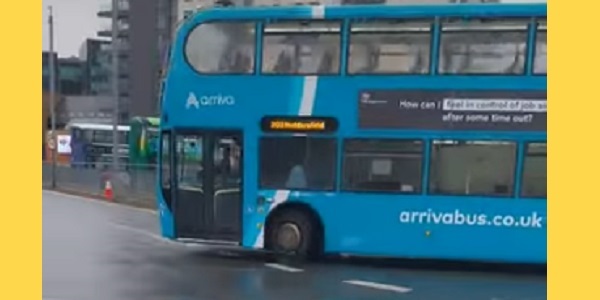
Buses outside London are operated by private companies – which the Starmer Government will continue to subsidise.
THE GOVERNMENT is blowing its trumpet today as it announces that it is keeping the cap on bus fares going. The cap, introduced by the last Government, means that travellers outside London won’t pay more than £3 for a bus journey.
Simon Lightwood MP, the Minister for Local Transport, is so happy he may burst. He explained, “Buses are vital to help people get to work, the doctor, or see their friends and family – they boost growth, support communities, and provide opportunity.” (They also cut the use of private cars, saving carbon emissions, Simon.)
“That’s why,” Simon continues, “we’re stepping in to make sure fares are capped at the lowest point possible, saving people up to 80% on travel and ensuring that our buses continue to be an attractive, affordable way to get around.”
The Department for Transport gives us some examples to explain Simon’s enthusiasm.
•A bus fare from Hull to York should cost £8.50, but under the cap the traveller pays £3 and the taxpayer pays the balance of £5.50.
•A bus fare from Leeds to Scarborough costs £15, but under the cap the traveller pays £3 and the taxpayer pays the balance of £12.
Some bus fares were previously capped at £2. These will rise by inflation and will not go up to the new £3 cap.
There are three reasons why this news is more spin than substance.
•First, the Tory Government set the budget for 2024/25 before they lost office, and Labour kept the budget. So Labour hasn’t found any new money. It has not withdrawn the cap – that’s all.
•Second, despite the Minister for Local Transport recognising how much people rely on buses, a £6 a day round trip to work is £30 a week – a sum that’s hard to find for those in low paid jobs. And a £6 round trip to the doctor is hard for those on benefits, for example.
•Third, this is yet another example of public money, paid by the taxpayer, going to subsidise private companies. The figures quoted as the “cost” of a bus journey are not the cost: they are the price that the bus companies choose to charge. The Minister should be trying to come up with ways to nationalise the bus companies – or “bring them back in-house” as local government would say – so that prices can be controlled and subsidy reduced.
That’s not what the Government is doing, though. A Bus Services Bill was introduced in Parliament on 17th December. This will allow Local Authorities to set up their own bus companies and issue their own franchises. The Government says this will make it easier to influence routes – not to take over this part of the transport infrastructure, and not to stop shovelling public money into the private sector.
This is all very far from the popular transport policy “fares fair”, introduced by Ken Livingstone when he was Leader of the Greater London Council in 1980 (a Labour Authority so popular that Tory Prime Minister Margaret Thatcher abolished it). A faint echo of Livingstone’s approach lingers in London, where Sir Sadiq has kept bus fares down to £1.75, with a daily cap of £5.50. Sadly there is little chance of a Labour Leader with the Livingstone approach turning up anywhen soon. Perhaps they’re stuck in traffic.
●To catch up with the news in East London, go to:
East London News